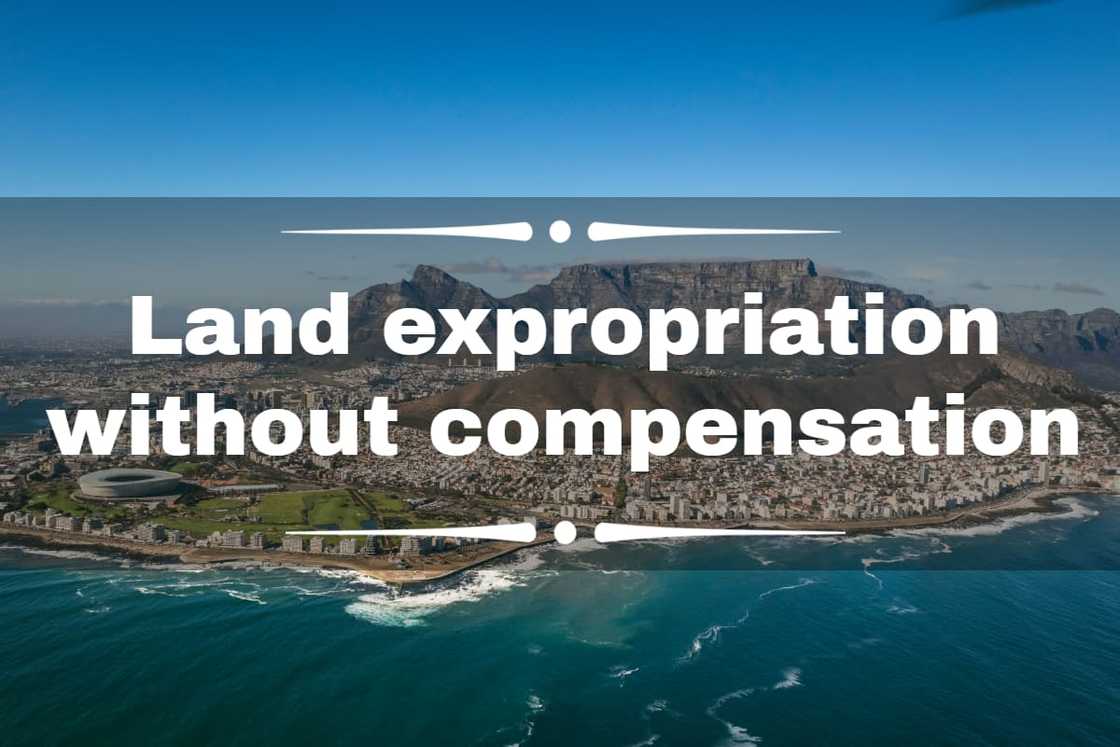Land expropriation without compensation: advantages and disadvantages
Land is a crucial asset in South Africa. Many people desire to own land where they can build homes, farm, or do business. Landowners protect their property with all their might, and issues like trespassing are frowned upon. It is not surprising that land expropriation without compensation evokes deep emotions.

Source: Getty Images
Julius Sello Malema, a South African politician and activist, created heated debate when he supported land expropriation without compensation in South Africa. He argued it was a feasible solution for settling historical injustices and healing the nation.
All about land expropriation without compensation in SA
Expropriation of land without compensation in SA means the government possesses the right to acquire land in private hands, even if owners do not want to sell it, without giving them any money. This is normally done for infrastructure and public services, not individual needs.
People who support this thought feel that the current system of willing-buyer-willing-seller is flawed. They support the government in repossessing all the land in the country and redistributing it equally among all citizens.

Read also
Over 50 shacks on Tembisa football field destroyed, leaving Mzansi divided: “the struggle is real”
Bill for expropriation of land without compensation
The motion to have the Constitution of South Africa reviewed to effect possible amendments for expropriation without compensation was adopted by The National Assembly on 27th February 2018 for the umpteenth time.
The date marked the 40th anniversary of Robert Sobukwe's death. Sobukwe was the founding president of the Pan-Africanist Congress (PAC), and his slogan was Izwe lethu, meaning the land is ours.
The motion was tabled by Economic Freedom Fighters (EFF), who explained that the state was the custodian of the country's land. EFF teamed up with ANC members to pass the motion.
In 2017, the same motion had been tabled in The National Assembly, but it did not go through because ANC members opposed it. At the time, many members of the house felt that it was unconstitutional to expropriate land without compensation. Others feared it would mess up the all land reform systems in the country.

Source: Getty Images
Bill passed: land expropriation without compensation explained
The South African National Assembly approved the land expropriation without compensation bill in September 2022 after 14 years. The Bill reviewed the Expropriation Act 63 of 1975.
After it was passed, Patricia de Lille, the Minister for Public Works and Infrastructure, explained the government had no intention of arbitrarily seizing land from private owners.
He further explained that the primary objective of the bill was to ensure all expropriation laws were in line with the Constitution of South Africa. The bill clearly outlined how expropriation should be done.
Advantages and disadvantages of land expropriation without compensation
Land expropriation without compensation has pros and cons, as explored below.
Advantages
The SA National Assembly passed the bill because it would bring the following advantages to all citizens.
- SA land will be equitably shared, meaning citizens and residents will get better living spaces.
- More people will get the opportunity to engage in agricultural activities.
- It is also possible that historical wrongs will be rectified, and the majority of South Africans will be able to own land.

Read also
Former ANCYL leader Andile Lungisa calls out ANC, warns party will lose power if it rejects radical transformation agenda
Disadvantages
It is important to note that the constitutional amendment made in 2022 may come with certain demerits, as explored below.
- The economy is likely to shake a little as investors wonder what such a move could mean to them.
- Existing property owners may feel destabilised because they are unsure of ownership of their land.
- The changes may make it easy to fall to political favouritism, cronyism, and complex bureaucracy under the current or future political leaders.

Source: Getty Images
What is expropriation of land?
It refers to giving the government of a country the right to acquire land in private hands, even if they are unwilling to sell. The use of the acquired property is normally limited to public purposes, e.g., the provision of infrastructure and public services.
What is land expropriation without compensation?
Land expropriation without compensation means the government has the right to acquire land for public benefit without reimbursing its previous owners.
Which is the best place to invest in South Africa?
The best place to invest in the country varies depending on one's dreams and needs. Some would rather invest in rural areas for agricultural purposes, while others prefer urban areas for commercial reasons.
The SA National Assembly recently approved the land expropriation without compensation bill. The relevant authorities assures citizens and residents that the government will not arbitrarily seize their land.
READ ALSO: Semigration meaning and why it is the in thing right now in South Africa
Briefly.co.za recently published the meaning of semigration and why it is popular in South Africa. Semigration refers to moving from one part of the country to another, which has become common after the COVID-19 pandemic.
Many citizens and permanent residents are now relocating to the coastal areas of the country. Many of them prefer working from home.
Source: Briefly News

Peris Walubengo (Lifestyle writer) Peris Walubengo has vast experience in search engine optimization through digital content generation, research, editing, and proofreading. She joined Briefly.co.za in November 2019 and completed the AFP course on Digital Investigation Techniques. You can email her at perisrodah254@gmail.com.

Cyprine Apindi (Lifestyle writer) Cyprine Apindi is a content creator and educator with over six years of experience. She holds a Diploma in Mass Communication and a Bachelor’s degree in Nutrition and Dietetics from Kenyatta University. Cyprine joined Briefly.co.za in mid-2021, covering multiple topics, including finance, entertainment, sports, and lifestyle. In 2023, she finished the AFP course on Digital Investigation Techniques. She received the Writer of the Year awards in 2023 and 2024. In 2024, she completed the Google News Initiative course. Email: cyprineapindi@gmail.com


